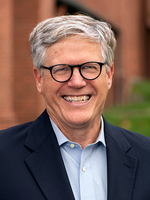The endeavor to figure out one’s calling can be mysterious, startling, even scary, but Bill Goettler says there’s no need to do it alone. In fact, it’s best not to.
 Goettler, assistant dean for assessment & ministerial studies at YDS, helps students discern their vocation, articulate life goals and find mentoring companions along the way.
Goettler, assistant dean for assessment & ministerial studies at YDS, helps students discern their vocation, articulate life goals and find mentoring companions along the way.
“The challenge is as old as Jesus calling his disciples,” says Goettler. “In essence he said: ‘I’m not giving you a guidebook. Let’s walk together awhile.’ “
Embarking on vocational insight and self-knowledge with trusted advisors is especially important in the caring professions. It’s hard to do that in a solitary way, he says.
“I think discernment is important for every human being, but especially for anyone in ministry, justice work, chaplaincy, or another caring profession. There, it has to be quite intentional. You need feedback from a community, the freedom to mess up, the opportunity to be encouraged by others to get up and get back to work. That’s too much to ask in isolation.”
At YDS, Goettler organizes a consultation with each M.Div. student, who arranges to sit down with a small group of valued associates in order to explore the seminarian’s latest thoughts or intuitions about vocational dreams and plans. This formalized sifting and assessing of personal calling happens halfway through the three-year M.Div. degree program.
“The goal of the mid-degree consultation is to help students find a vocational focus and conversation partners,” Goettler says. “How do we find mentors and companions and wise models for the work we want to do? It’s an important question.” (See his article in Reflections journal, “So Far So Good: The Mid-Degree Consult,” Spring 2012, at reflections.yale.edu)
The digital era offers a global-scale sense of online community and social possibility but cannot replace the value of face-to-face exchange in a person’s search for self-identity, he argues.
“In the digital world we are able to function in places of greater isolation, but social media isn’t the same thing as being in conversation with someone late in the night across the table. There’s still a deep hunger to know and be known.”
The spirit of the new century – entrepreneurial, pluralistic, distrustful of institutions but spiritually curious – can complicate the question of calling. In some cases, Goettler says, bonds between divinity student and denomination have grown more tenuous. The spiritual options increase. This can be exciting, or confusing.
“For many students, the emergent career path is less clear these days at the point of their entry into a degree program,” he says.
“Lots of folks are less inclined to feel the institutional church will be the place for their entire career. They’re not anti-denominational, but the institutional church doesn’t fully define them. Some are looking to shape ministry differently, searching for what might be new ways to do ministry and theological reflection – perhaps in smaller worship communities, teaching faith and worship life. There’s a real curiosity about that. It’s fun to see what turns their heads.”
Growing up as the child of two social workers in Allentown, PA., Goettler had a variety of mentors in his early years.
“I was very much a church kid,” he says. “It was a progressive ’60s Presbyterian church, a very healthy place. I wanted to be there all the time.”
After college he worked for a time in newspaper journalism, but his heart was in economic justice and activism. He became a community organizer in Utica, NY, where new mentors demonstrated the passion and drive needed for such advocacy.
Still, something else was tugging at him: Christian ministry.
“I thought I didn’t want get involved in structures and ordination. But I wasn’t convinced social justice alone was adequate. The life of the spirit needed to be nurtured. I realized that I needed to engage heart and soul, and Christian ministry was the way to do that.”
He went to Union Theological Seminary, doing field-work assignments at the parish level. He made a discovery:
“I fell in love with the congregation. That work is what I wanted to do.”
Ordained in the Presbyterian Church (USA), he led congregations in Albany, NY, and Wilmington, Del. In 1998, he and his wife, Maria, became co-pastors at First Presbyterian Church in New Haven, where they continue to serve. His YDS association started in 1999, when he was invited to teach a Presbyterian polity course. He has written for a range of publications, including the prologue for the 2008 book Global Neighbors: Christian Faith and Moral Obligation in Today’s Economy (Eerdmans).
Goettler speaks with admiration about the younger people at his local church, their interest in the spiritual adventure and their willingness to do it together.
“There are 20-somethings who worship with us, but it’s not all they want to do. They care about the conversation. They don’t have the fear we once had about engaging the hard questions or risking their own responses. They’re trying to find how to be healthy spiritually, politically, socially. They want to teach each other and search together.”
He says that sense of the journey yields clarity and purpose when YDS students chose to engage the sometimes anxious question of calling.
“It’s exciting to see students daring to be honest about the questions and discussing what’s good and just and right. Many find real purpose and focus. Our school is trustworthy as a locale for that kind of journey.”
| Attachment | Size |
|---|---|
| 28.87 KB |